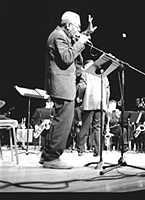

bell hooks is in the Co-op Bookstore beside Anita Hill, and Amiri Baraka hates Clarence Thomas. Coincidence?
Not when hooks and Baraka kicked off this past week of Black History Month with book-signings at the Co-op and speeches at Afrikan Heritage House.

hooks, who has written more nonfiction books than any other black woman, dropped by the College again this year to dispense wisdom and remind us again that, "They didn't treat me right at Oberlin."
Long before Oberlin, hooks wrote her first book, entitled Ain't I a Woman, at the age of 19. Today, at the age of 46, she has seventeen books under her hair pin and has no visible plans of slowing down.
In contrast to her literary dialect, hooks' voice is surprisingly soft- spoken. She addressed her crowd like friends, dropping anecdotes and stopping her address to welcome people as they walked in.
hooks spoke about the lack of recognition that she gets as a black female writer who only writes nonfiction about African Americans. "You don't see a review of my books in Newsweek," she said. "People don't want to hear what black writers have to say about themselves."
Stating that she considers herself a "diva of race, class and gender analysis," hooks also expressed her disappointment with the reception of her books, citing that black women have been the most negative critics of her work.
hooks' visit continued with an appearance at the Afrikan Heritage House on Monday night. She began the evening by reading selected passages from a paper she recently published which deals with the nature of the black community. "We need a notion of solidarity and community," said hooks.
hooks began describing a personal ideology which blames the "white supremacist, capitalist, patriarchal world" for the majority of problems in society, and challenged students to fight against oppression.
"Fascism comes while we sit munching junk food, while we see bombings, gated communities, chain gangs and the death penalty on TV, and we are comfortable with it," she said.
hooks spoke openly of her problems with white culture. While this made many audience members noticeably uncomfortable, causing them to shift in their chairs, the shifting Monday night was mostly to see over the heads of the other people present in the crowded room.
One particularly well-received comment was hooks' credit of much of the sexual conservatism within the black community to prominent male figures of the Black Power movement. "But of course now we know that a lot of them were bisexual and were afraid of themselves. That's why they were anti-gay," she said.
One of hooks' points on race dealt with the Black bourgeois who have "betrayed their culture." One person repeatedly downsized was writer Cornell West. First-year Jo Bauer particularly appreciated hooks' statement, "I'm not interested in Cornell West talking about he can't get a taxi, because he can get a limousine!"
When it comes to anti-capitalistic sentiment, Amiri Baraka is an expert. "Anything that's against racism and capitalism, I'm all for it!" he said at his conversation at the House Wednesday night.
Baraka also condemned the black bourgeois, reminding black students that "you were not sent here to betray your people and disappear into the fog of petty bourgeois ignorance." He stated that some of the worst white supremacists he's ever seen are black, mentioning one black man in particular.
Saying that he did not like to name names, Baraka warned the crowd to watch for the name in reverse before he launched into a cut from a poem containing the words "Tom S. Clarence."
Baraka continued, "I am in a tradition of Walker, DeBois, Tubman, Duke Ellington, and Malcom X." He talked about the assassinations of Martin Luther King, Jr., Malcom X, and Bobby Hutton, and commented on his view of black history.
One of Baraka's most popular anecdotes of the night concerned his visit to Senegal, the country of "some of the biggest slave traders in the world." Baraka said that an African brother asked him, "How do you like the living in the white man's country?" He turned and countered, "You wanna talk about how we got over there?"
Though both hooks and Baraka spoke to the increase of awareness within the black community and the decolonization of the brains of all people, the two differed on their visions of feminism. hooks spoke positively of the movement and its organization, while Baraka disagreed with the structure of the movement. He criticized "those women who tie freedom of abortion with equal rights," and suggested that "if you want equal rights, you should fight for equal rights, not abortion because that's not equal rights."
hooks and Baraka did not cross paths this week, but Baraka and Acting Director of Oberlin Jazz Studies Hugh Ragin did. The two collaborated with the Oberlin Jazz Ensemble in what resulted in over three hours of jazz and poetry.
Ragin and the Ensemble played four songs, and then did a piece which set the stage for Baraka's entrance. Baraka performed two long poems, Allah Mean Everything and A Message from Sun Ra.
Powerful figure: Amiri Baraka performed at Finney Thursday. (photo by Areca Treon)
Copyright © 1998, The Oberlin Review.
Volume 127, Number 15, February 26, 1999
Contact us with your comments and suggestions.